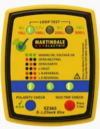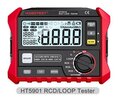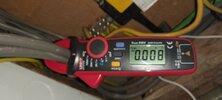- Joined
- 27 Jan 2008
- Messages
- 24,925
- Reaction score
- 2,882
- Location
- Llanfair Caereinion, Nr Welshpool
- Country

Be is a SDS drill, multi-tool, or multi-meter, there are clearly tools aimed at the pro, and the DIY, but DIY tools do seem to have improved over the years, and quantity produced means the DIY version is so much cheaper, so is it worth even the professional buying the tools aimed for the professional?
OK some times no option, my loop impedance tester and RCD tester does not have a calibration certificate, so is not really any good for the pro, but I look at this plug in socket tester with loop at £67.90 and this one
at £67.90 and this one  around the same price, and it seems Martindale is milking it some what, specially since with a ring final the pass point is 1.38Ω and the Martindale version starts at 1.7Ω so don't even know if the socket has passed.
around the same price, and it seems Martindale is milking it some what, specially since with a ring final the pass point is 1.38Ω and the Martindale version starts at 1.7Ω so don't even know if the socket has passed.
My cheap battery SDS drill does not have a rotor stop so can't be used with a chisel, my pruning tool (little chain saw) is on the end of an arm a little unwieldy, but it does the job.
Where I work they have bought good quality tools, but when it came to the final tidy up of the season, most of the volunteers brought in their own strimmers, chain saws, brush cutters etc, because they were lighter and easier to use.
One walks up the specials aisle in Aldi or Lidi and they are full of reasonable quality DIY tools. Specials like this cable finder even the tradesman tends to hire when required, the Fluke clamp meter
even the tradesman tends to hire when required, the Fluke clamp meter
 one sees as a professional tool, but it will not measure DC amps, there are specials Ethos for example designed to read down to 1 mA to test earth leakage, but the name is not well known, and the
one sees as a professional tool, but it will not measure DC amps, there are specials Ethos for example designed to read down to 1 mA to test earth leakage, but the name is not well known, and the  UT210E from UNI-T will measure DC amps and down to 1 mA for a fraction of the price, so is it worth buying the professional models anymore?
UT210E from UNI-T will measure DC amps and down to 1 mA for a fraction of the price, so is it worth buying the professional models anymore?
As to lasting, well I still have my grandads wolf cub drill, and my Black & Decker hammer drill the latter bought in the 70's former likely the 60's so DIY tools do last. OK would not use the Black & Decker hammer drill now I have a SDS drill, and most the tools for it have been lost, I only keep it as it will still work my wood turning lathe, but for DIY use they have lasted.
I look at my Parkside 16 volt drill/screwdriver, and realise now they are 20 volt, so when the battery fails, good by drill. But it has and still is giving sterling service, sons DeWALT was stolen, and this is the problem with expensive stuff, one spends more time securing it than using it, if you want to keep it.
OK some times no option, my loop impedance tester and RCD tester does not have a calibration certificate, so is not really any good for the pro, but I look at this plug in socket tester with loop
 at £67.90 and this one
at £67.90 and this one  around the same price, and it seems Martindale is milking it some what, specially since with a ring final the pass point is 1.38Ω and the Martindale version starts at 1.7Ω so don't even know if the socket has passed.
around the same price, and it seems Martindale is milking it some what, specially since with a ring final the pass point is 1.38Ω and the Martindale version starts at 1.7Ω so don't even know if the socket has passed.My cheap battery SDS drill does not have a rotor stop so can't be used with a chisel, my pruning tool (little chain saw) is on the end of an arm a little unwieldy, but it does the job.
Where I work they have bought good quality tools, but when it came to the final tidy up of the season, most of the volunteers brought in their own strimmers, chain saws, brush cutters etc, because they were lighter and easier to use.
One walks up the specials aisle in Aldi or Lidi and they are full of reasonable quality DIY tools. Specials like this cable finder
 even the tradesman tends to hire when required, the Fluke clamp meter
even the tradesman tends to hire when required, the Fluke clamp meter  UT210E from UNI-T will measure DC amps and down to 1 mA for a fraction of the price, so is it worth buying the professional models anymore?
UT210E from UNI-T will measure DC amps and down to 1 mA for a fraction of the price, so is it worth buying the professional models anymore?As to lasting, well I still have my grandads wolf cub drill, and my Black & Decker hammer drill the latter bought in the 70's former likely the 60's so DIY tools do last. OK would not use the Black & Decker hammer drill now I have a SDS drill, and most the tools for it have been lost, I only keep it as it will still work my wood turning lathe, but for DIY use they have lasted.
I look at my Parkside 16 volt drill/screwdriver, and realise now they are 20 volt, so when the battery fails, good by drill. But it has and still is giving sterling service, sons DeWALT was stolen, and this is the problem with expensive stuff, one spends more time securing it than using it, if you want to keep it.
